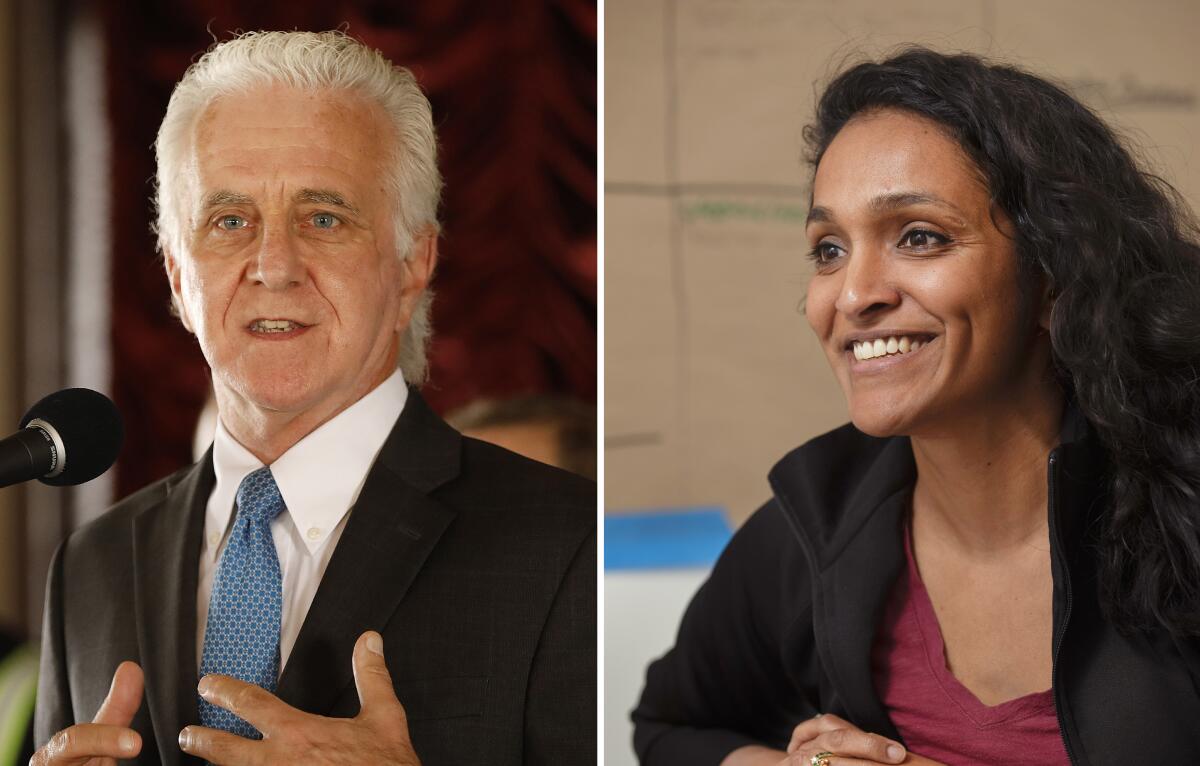L.A. council president slams redistricting map, saying it has ‘alienated thousands’

Los Angeles City Council President Nury Martinez spoke out Friday against a citizen commission’s proposal for redrawing the council’s 15 districts, saying it makes “drastic changes” to political boundaries that “threaten to widen the divides between communities.”
Martinez, who represents part of the San Fernando Valley, said in a statement the proposed changes have “confused and alienated thousands” — a message that increases the likelihood that council members will significantly rework the map.
“While some areas kept their assets and neighborhoods whole, poverty was concentrated in other communities that have already suffered from disinvestment and neglect for generations,” Martinez said.
A spokeswoman for Martinez said the council president was describing two districts — her own, which includes such areas as Van Nuys, and a proposed district that would take in Winnekta and other West Valley neighborhoods.
The council president issued her remarks less than a day after a 21-member citizen commission voted 15 to 6 to approve its final map, which would make major alterations to the boundaries of three council districts — those represented by Nithya Raman, Paul Krekorian and Bob Blumenfield.
Commission Chairman Fred Ali, one of Martinez’s appointees on the panel, pushed back on the council president’s claims, saying any assertion that the map concentrates poverty in certain communities is “patently false.”
Ali said the commission “took great care to ensure that traditionally disadvantaged districts included critical economic assets.” Martinez’s district has the Van Nuys Civic Center, he said, while the Winnetka district has Pierce College and Van Nuys Airport.
“It wasn’t our job to protect elected officials, their jobs or their political futures,” Ali said. “We hope the council conducts its deliberations with the same amount of transparency and commitment to equity that this commission did.”
The council will receive the commission’s written report at the end of next week.
Under the proposal, one council member — either Raman or Krekorian — would be assigned to represent a new district proposed for the west San Fernando Valley, which would include Winnetka and other nearby neighborhoods. The other would be assigned to a district encompassing the Hollywood Hills, Griffith Park, North Hollywood and other areas.
Krekorian, who won reelection last year to his third and final term, currently represents the east San Fernando Valley’s 2nd District. Raman, who has been in office less than a year, represents the 4th District, which stretches from Hancock Park to Silver Lake and north to Sherman Oaks.
The commission declined to assign council districts to either Raman or Krekorian, instead labeling them as Districts 2-or-4 and 4-or-2.
Meanwhile, Blumenfield’s southwest Valley district would be stretched considerably to the east, reaching as far as Valley Village. That shift would cause him to lose other neighborhoods, including Canoga Park and Reseda.
Critics of the map have argued that the changes would make Blumenfield’s 3rd District whiter and wealthier. Defenders of the map have countered that the proposed Winnetka district, located next to Blumenfield’s, would give voters a much stronger chance of electing a Latino to represent the West Valley.
A new map must be approved in time for it to go into effect Jan. 1.
Martinez is the latest council member to speak out against the proposal. In recent weeks, Raman and Krekorian have argued that the map would disenfranchise many of the people who voted for them last year by putting them in different districts.
On Friday, Krekorian called the map “an embarrassingly bad work product for the San Fernando Valley,” one that unnecessarily disrupts the region.
“It needs to be rejected and, at least with regard to the Valley, needs to be redone,” he said.
The L.A. City Council Redistricting Commission has had a punishing schedule in the recent weeks, conducting four meetings in seven days, each stretching for several hours. By the time the map came up for a final vote, the mood on the panel was mostly subdued.
Commissioner Jackie Goldberg, an appointee of Raman, decried the idea that Raman, who took office in December, could be assigned to a West Valley district that’s entirely new to her.
“There is no precedent for stripping a first-term council member of 100% of their constituents,” said Goldberg, a former city councilwoman who sits on the L.A. school board.
Another commissioner said “the Valley is in turmoil” over the map.
Commissioner Richard Katz, an appointee of Blumenfield, disputed that notion, saying the map would achieve a long-sought goal: placing five districts and the vast majority of a sixth inside the Valley.
The commission map, Katz said, achieves things that have been “on the Valley agenda for a really long time.”
Other commissioners said the proposal would achieve additional policy objectives: placing Koreatown in a single council district, ensuring the opportunity for Black or Latino representation in certain parts of the city and consolidating heavily Jewish neighborhoods on the Westside into a single district.
The commission also weighed in on the fight over economic assets in South Los Angeles, placing USC in Councilman Curren Price’s district but putting the adjacent Exposition Park in Councilman Marqueece Harris-Dawson’s.
“What the council does after this is up to the council,” said Commissioner Carlos Moreno, a retired judge appointed by City Atty. Mike Feuer, who is running for mayor. “But I think no one can really question that each of us, and collectively, we’ve done our best.”
The city redraws its council district boundaries every 10 years, after receiving data from the once-a-decade U.S. census.
After obtaining that information, city leaders must approve maps that give each district roughly an equal population and protect the voting rights of certain groups, including Black, Latino and Asian American residents.
More to Read
Sign up for Essential California
The most important California stories and recommendations in your inbox every morning.
You may occasionally receive promotional content from the Los Angeles Times.











